From Scales to Stethoscopes: My Journey from Music to Medicine
Callista discusses her journey of transitioning from a Queen's Music graduate to a Mature Medicine student; and shares some tips and advice for managing the transition from arts/humanities to science.

A little bit about me…
Hi everyone! My name is Callista Middleton and I’m a third-year medical student at Queen's (if you become a student here, this phrase will soon be second nature to you.) I’m a mature graduate student, with my first degree in Music. After taking two years out to help gather funds and complete additional courses needed to get into Medicine, I started my second degree in 2022.
The transition between studying humanities versus a more science-based curriculum was a big change, but I’m here to help you with some of the tips and tricks that got me into medicine and through my first year, as well as beyond.
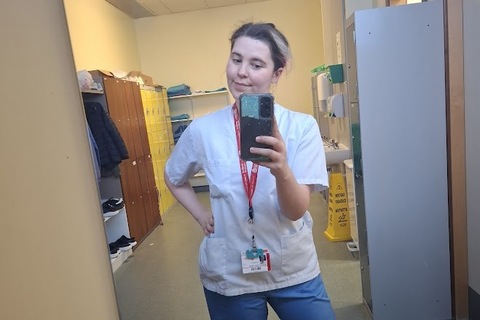
Callie on placement
Why did I choose Queen's?
When looking to study at a tertiary level, it is important to do some research surrounding the university offering the degree that you are interested in. This was something I really had to invest some time into as funding becomes an issue when you already have a primary undergraduate degree.
Because I didn’t want to take on any additional loans, I decided that staying in Northern Ireland was best suited to my financial situation. At that point, it was then a choice between Queen's and Ulster. This is because Ulster have recently began offering a post-grad specific Medicine degree. However, you must undertake and pass the GAMSAT to be able to apply.
At the time I was preparing my application, I had been out of education for one full year and had only recently completed my chemistry A-Level. I decided that I would personally prefer to have a better understanding of the scientific principles underscoring medicine by applying for a full undergraduate degree.
When looking at Queen's, I noted that their first-year modules involved something called the ‘Fundamentals of Clinical Science.’ I realised at this point that the traditional curriculum that Queen’s employs (2 years classroom teaching, 3 years on placement) would be a better fit for my transition between the humanities and sciences. This was particularly evident when I joined in first year and they really pulled everything back to basics.
I felt like I could keep up with my more scientifically educated peers without needing to do copious amounts of additional study. Furthermore, I had studied at Queen's before, so knew that the university had great staff, robust wellbeing services in place, and that I loved living in and around Belfast.
Why did I study Medicine after Music?
When I tell people that I’m a graduate, one of the first questions I get asked is, “What was your previous degree?” The next question almost 100 per cent of the time is then, “What made you change from Music to Medicine?” If you are now in a similar boat, have an answer ready – even now, I regularly get asked this whilst on placement. Each time, I answer it with the same few reasons I’ve always given. Ever since I was young, I’ve had a strong interest in science, but my A-Level results left a lot to be desired.
When looking at university entry-requirements, my initial results meant that I would be unable to apply for any science degree, let alone a highly coveted and competitive spot in medicine. As such, I decided to study a subject I found interesting – it helped that I was also pretty good at it as well! I put my dream of studying science on the back burner and dedicated all my time to music. This meant that I was able to graduate in 2020 with a first, just in time for the Covid-19 pandemic to sweep through the nation.
With the world grinding to a halt, this gave me a chance to look again into studying a science-based degree. I looked at the entry requirements for a variety of subjects - radiology, biomedicine, and even paramedic science. However, I quickly realised that graduate-entry medicine would be my ticket into the career I had always dreamed of having.
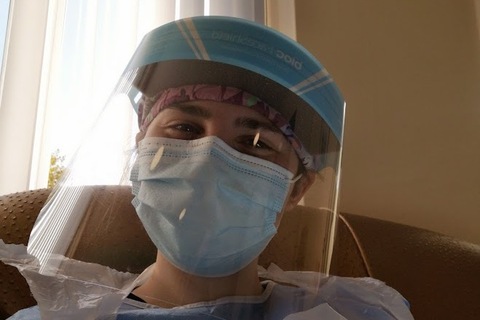
What was the application process like for Medicine?
The application process for Medicine at Queen's was quite different from my first degree. Firstly, you must complete a test called the University Clinical Aptitude test (UCAT) which is usually available the summer before you apply to UCAS. When I was completing this exam, the test had 4 sections each worth between 300-900 for a total of 3600. This has now dropped to only 3 sections, removing abstract reasoning.
You do need an appropriate science background, so before I applied, I had gone back to the Belfast Met and completed a fast-track Chemistry A-Level. I was able to get a member of staff there to read through my UCAS personal statement for me and act as my reference. I was then shortlisted in December and completed my Multi Mini Interview (MMI) in February. This is a series of short, timed stations with different examiners that tests your soft skills – think communication, adaptability, and problem-solving.
Usually, you are given a scenario and asked questions, however you may need to roleplay, so be expected to think on your feet. Less than a month later, I found out that I had an unconditional offer and the rest is history!
My top tips for applying would be:
- Start studying for the UCAT at least a month before your booked test date, and even earlier if you can! It’s all about practice, practice, practice.
- If you can, grab some work experience in the hospital, or better yet, spend some time working as a healthcare assistant. This is great experience and helps your application stand out. You get a chance to really see what the healthcare system is like from the ground up and for me, it really confirmed that I wanted to work with people in a healthcare setting.
- Find a friendly lecturer to help read over your personal statement and act as an academic reference for you. If it’s been a long time since you’ve been in academia, contact Queen's to ask for advice on who may be appropriate.
- Prep for your interview by learning and integrating the 4 pillars of ethics into your answers, simulating role play with willing friends/family and reading around the common questions that arise. Confidence is key in passing these, and nothing screams it more than someone who can answer anything thrown at them.
For graduate students, the entry requirements are lowered at Queen's, so don’t be put off when you see all the A*’s and A’s! Scroll down the course page and you will see a section dedicated to students just like you or me. Double check if your A-levels are appropriate, and if not, you can complete them with additional schooling at a regional college.
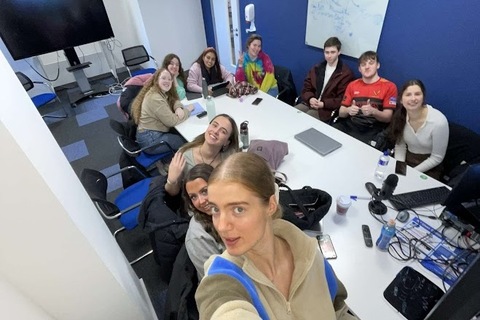
The transition from Music to Medicine
The transition from music to medicine was initially tough to manage. As well as having a natural talent for the subject, I had time to work on my assignments, and I was able to chat with everyone on my course - there were only 15 people doing the BMus degree pathway!
Medicine was completely different. My first proper lecture was with around 270+ people. I felt like a little fish in a huge pond, and very out of my depth. The first few weeks were filled with constant introductions and if I’m being honest, it’s still like that to this very day. However, I quickly made friends and started to settle in. I had freshers and the case-based learning (CBL) groups to thank for that!
The actual work was also a big step up. The sheer amount of information thrown at you in those first weeks was a lot to take in, and I didn’t have the same natural aptitude for it that I had for Music. It was hard at the start, but once I got into the groove of doing a solid 30 minutes every evening, I got up to speed quickly. I’d say that all in all, I was properly settled into the swing of things about 1 month in, which I think is pretty good going!
I found both degrees to be heavily reliant on having strong self-motivation and good time-management skills, so if you are already blessed in these departments, you would manage any subject transition with ease.
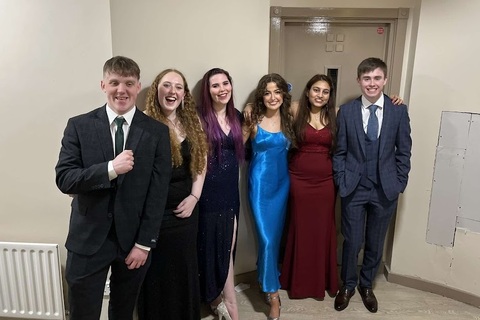
Getting ready for the Medicine formal
Do you have any tips or tricks for studying?
Applying for Medicine means putting yourself forward for a life-long commitment to studying. As future doctors, it is important that you keep up to date with the latest research, guidelines, and innovations associated with your chosen speciality. Before that however, you need to gain a vast and more generalised knowledge base. Here are a few of my tips and tricks for getting your study on.
- Little and often – Rather than have huge study sessions that end up with too much money spent at Clements in the McClay, I prefer to study for a maximum of 1 hour each day (and if I’m being honest, usually less). This has really helped me do focused sessions on areas I struggle with and allowed me to have a healthy work/life balance.
- Plan out your studying – Before getting down and dirty with it, I prefer to spend a few minutes planning what I hope to study. Whether it be a single difficult lecture, a number of related conditions, or practicing some MCQs, creating goals helps to focus your study and allow the time spent to really matter.
- Breaks are best – Everyone is different here, but I prefer to take a quick break from studying every 20 minutes. Whether this be a walk and stretch around the room, a quick scroll, or even just a simple 5 minutes to myself, this helps reorientate my brain as it starts to wander off topic after a while. I always do this in the days running up to exams when I tend to have longer study sessions of multiple hours.
- Flash cards – I am a huge fan of using ANKI, and you will hear many other med students say the same. You can make your own decks or use others to supplement your learning. It’s great for information retention as it uses spaced repetition. A couple of cards every day saves hours of cramming right before those pesky progress tests.
- Unique technique - When it comes to studying, everyone is different. Some people prefer walls of text, whilst others like copious amounts of colour and flow chart galore. Experiment with different styles of taking down information and find what works for you.
Finally…
I want to leave you with a small anecdote from my first placement this year. During my induction at Antrim Area Hospital, a consultant asked us to undertake some ice-breaking questions to get to know us better. One such question was if any of us were post-graduates. Several students, including myself, raised our hands, and each said what subject we initially studied in turn. When I said Music, I expected the usual questions of “Why Music?” and “Why Medicine?” but they never came. Instead, the consultant smiled and said, “Music? Wow, what an interesting first degree. I’m sure you have a great deal of unique skills that you can bring to medicine.”

A night out in Belfast
This conversation that I had had hundreds of times with the same mundane responses and answers had suddenly flipped my world view on my place in medicine. It helped me to realise that though my journey into Medicine may not have been traditional, I have worked hard to get to where I am now. It has been a long journey, but one I have loved every minute of. I hope you enjoy yours, wherever it may take you.
Find out more
Why I Chose Queen's for Medicine
A Day in the Life of a Medicine Student at Queen’s
A Week in the Life of a Medical Student at Queen's
Callista MiddletonMedicine | Undergraduate Student | NIMy name is Callista (Callie) Middleton and I am a third year medical student at Queen's. |
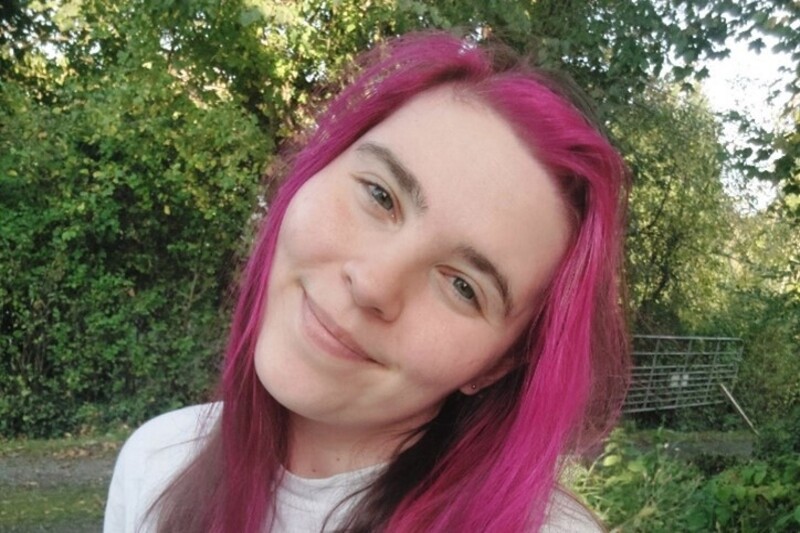 |